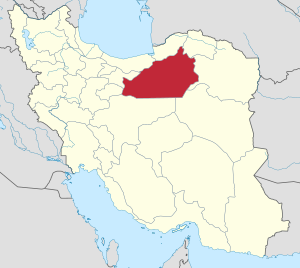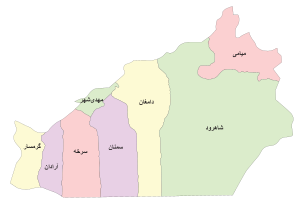Semnan province facts for kids
Quick facts for kids
Semnan province
استان سمنان
|
|
|---|---|

Location of Semnan province in Iran
|
|
 |
|
| Country | Iran |
| Region | Region 1 |
| Capital | Semnan |
| Counties | 8 |
| Area | |
| • Total | 97,491 km2 (37,641 sq mi) |
| Population
(2016)
|
|
| • Total | 702,360 |
| • Density | 7.20436/km2 (18.65920/sq mi) |
| Time zone | UTC+03:30 (IRST) |
| ISO 3166 code | IR-20 |
| Main language(s) | Semnani languages, Persian |
| HDI (2019) | 0.807 very high · 4th |
Semnan Province (Persian: استان سمنان, Ôstâň-e Śemnân) is one of the 31 provinces in Iran. It is located in the northern part of the country. The main city and capital of the province is Semnan.
The province covers a large area of about 96,816 square kilometers. It stretches along the Alborz mountain range. To its south, it borders the Dasht-e Kavir desert.
In 2016, about 702,360 people lived in Semnan Province. Many different groups of people live here, including those with Kurdish, Turkish, Lor, Arab, Baloch, and Gilak backgrounds. Because of this mix of cultures, Semnan is sometimes called the "Island of the Tribes."
Contents
A Look at Semnan's Past
Semnan has a very long history, dating back to ancient times. In the days of the Median and Achaemenid empires, it was one of the largest provinces. Today, its borders are similar to the ancient region of Parthia.
During the time of the Islamic era, Semnan was part of a historical area called Gomess or Komesh. The famous Silk Road, an ancient trade route, passed right through this region. This means Semnan saw many important events and even wars over the centuries.
Today, there are many historical and cultural sites in Semnan. The Cultural Historical Heritage Organization of Iran has listed 470 such places. These include old palaces, forts, castles, and caravansarais (roadside inns for travelers). There are also many religious and sacred places to visit.
Exploring Semnan's Geography
Semnan Province has two main types of land. One part is a mountainous region. This area is great for outdoor activities and also has valuable minerals. The other part is made up of plains at the foot of the mountains. These plains are home to some very old cities in Iran. One of these cities was even a capital of the ancient Parthian Empire.
Semnan shares its borders with several other provinces. To the north, it neighbors Golestan and Mazandaran. To the northeast, it borders North Khorasan province. Tehran and Qom provinces are to its west. To the south, you'll find Isfahan province. Finally, South Khorasan province is to the southeast, and Razavi Khorasan province is to the east.
The Ancient Abr Forest
The Abr Forest is a special place in Semnan Province. It is located near the border with Golestan Province. This forest is one of the oldest in Iran. It is a leftover from a very old geological age, making it a unique natural treasure.
There was a big discussion about building a road through this forest. Many environmental groups and media outlets spoke out against it. They wanted to protect the forest because it is so important. The Prosecutor General even ordered the road construction to stop for a while. However, the government later gave permission for the road to be built.
How Semnan is Divided
Semnan Province is divided into smaller areas called counties. Here is a table showing how the population has changed in these counties over the years:
| Administrative Divisions | 2006 | 2011 | 2016 |
|---|---|---|---|
| Aradan County | — | — | 13,884 |
| Damghan County | 81,993 | 86,908 | 94,190 |
| Garmsar County | 77,676 | 81,324 | 77,421 |
| Mehdishahr County | — | 41,896 | 47,475 |
| Meyami County | — | — | 38,718 |
| Semnan County | 186,159 | 182,260 | 196,521 |
| Shahrud County | 225,007 | 238,830 | 218,628 |
| Sorkheh County | — | — | 15,523 |
| Total | 570,835 | 631,218 | 702,360 |
Cities in Semnan Province
Most people in Semnan Province live in cities. In 2016, about 80% of the population lived in cities. Some of the larger cities include:
- Semnan (the capital city) with 185,129 people.
- Shahrud with 150,129 people.
- Damghan with 59,106 people.
- Garmsar with 48,672 people.
- Mehdishahr with 24,485 people.
- Eyvanki with 13,518 people.
- Shahmirzad with 11,191 people.
- Sorkheh with 9,951 people.
Languages Spoken in Semnan
While Persian is the main language of Iran, Semnan Province is also home to a group of special languages called the Semnani languages. These languages are sometimes thought of as dialects. In 2019, about 68,700 people spoke one of these languages.
The Semnani languages are related to older Iranian languages. For example, many of them come from the ancient Parthian language. The Semnani language itself is similar to the Caspian languages. It also shows influences from the ancient Median language.
There are six Semnani languages often mentioned: Semnani, Biyabunaki, Sangsari, Sorkhei, Aftari, and Lasgerdi. Scientists are still studying how these languages are connected to each other.
Images for kids
See also
 In Spanish: Provincia de Semnán para niños
In Spanish: Provincia de Semnán para niños
- Bayazid Bastami
- Ashraf Jahangir Semnani
- Darius III
- Dasht-e Kavir
- Fath Ali Shah Qajar
- Hassan Rouhani
- Hecatompylos or Shahr-e Qumis
- Khar Turan National Park
- Mahmud Ahmadinejad
- Manuchehri Damghani
- Parthia
- Rig-e Jenn
- Sangsar (Mahdishahr)
- Seleucids
- Semnani language
- Yadollah Royaee
 | Leon Lynch |
 | Milton P. Webster |
 | Ferdinand Smith |




